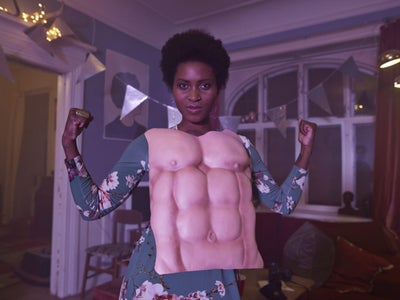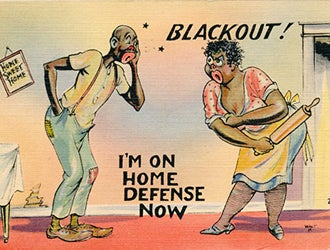7 Career Women Told Me How They Feel They’ve Been Masculinized For Their Ambition
[ad_1]

I remember watching the viral clip of T.D. Jakes’ sermon about modern Black women’s role in the household slack-jawed. Last year on Father’s Day, the lauded religious figure passionately preached to his large congregation why today’s women aren’t encouraged to embrace their femininity, but instead find too much pride in their professional accomplishments.
“This breaks all the sociological order of the culture we are living in now. Because we are raising up women to be men,” said Jakes. “And you are not applauded for your femininity,” he directed to his female congregation. “You are applauded in the contemporary society by how tough, rough, nasty, mean, aggressive, hateful [and] possessive you are. And you’re climbing the corporate ladder, but we are losing our families.”
He continued: “I know you can buy your own car. I know you can buy your own house. But until you create a need that I can pour into, I have no place in your life. So stop coming home bragging to me about how much you don’t need me, and wonder why I shy away.” Later on in the sermon, he attempted to balance his argument stating that men should take accountability for inadvertently creating hyper-independent women through generational irresponsibility, but for me, at that point, the damage was already done.
I was shocked by how offended the message left me. It wasn’t just because I disagreed with the bishop’s POV, one he’s fully entitled to, by the way. It was because I felt betrayed by him.
Jakes has been a staple in Black households for years and has espoused Christian teachings that can arguably, lean misogynistic is relayed by the wrong messenger. But he’s expertly managed to deliver “the word of God” through a pragmatic and sometimes even feminist lens.
Unfortunately, the sermon only stoked a long-simmering firestorm that’s been long burning on social media, with controversial figures like Kevin Samuels fanning the flames, even posthumously.
At the height of Samuels’s popularity, the former Youtube personality regularly shared his views about career women failing themselves, and how their assertiveness and ambition would lead to their detriment since they wanted to take a man’s place in society.
Although his opinions may seem new, they’re merely an upcycling of long-held views since the rise of feminism’s first wave, in which angry husbands contested their wives right to vote and work. Although white women were the face of the Suffrage Movement of the 1880s, it was Black women that bore the brunt of a harsh depiction of their image.
The Sapphire Caricature was one used to satirize Black women since the 1800s in which they were depicted as fiery figures who ran their own homes with iron fists, including emasculating the Black husbands and berating their children.

A report by Ferris State University explains: During the Jim Crow period, when real blacks were often beaten, jailed, or killed for arguing with whites, fictional Mammies were allowed to pretend-chastise whites, including men. Their sassiness was supposed to indicate that they were accepted as members of the white family, and acceptance of that sassiness implied that slavery and segregation were not overly oppressive.
More than 200 years later, the Sapphire trope has gone through a rebrand and still lives on in social media conversations and podcast discussions about what it means to submit to a man, and whether cis-het women should prioritize their careers or finding a loving relationship.We seem to keep having the same struggle over and over…and over again.
So, how do professional Black women feel about the age-old topic today?
I posed the question on social media, in forums and even to my friends. Here’s what they shared with me.
Dr. Courtney Gilbert, physical therapist and founder of Grind 2 The Goal
“It’s so crazy the difference in response you receive from men and women regarding ambition. For example, I was commended by my sorority sister for managing so many different aspects of my career and excelling at everything despite the challenge. Conversely, I once dated a guy that decided to break it off because he said I acted too much like a man because I paid equal attention to him as I did to my career, much to his chagrin. He expected to come first.”
Brittny Horne, Founder & CEO at RVL Wellness Co.
“I have felt more burdened than chastised by others regarding my professional aspirations. I felt like I had to carry the weight of the world on my shoulders in order to achieve as a Black woman. I was pushed to advance my career as much as possible to please others and do the traditional or right thing even if it meant damaging my mental health.”
Monique McGrant, 2nd generation owner of McGrant Tax & Bookkeeping
“On numerous occasions, representatives from various companies would come by our offices to sell products or services. Many would walk in and automatically ask for “Mr. McGrant.” Once they were informed “Mr. McGrant” did not exist, they were shocked to see that the owner was a Black woman. Imagine being in your own business and your male employees are recognized as the boss before you are, simply because of your gender.
Now that I am in the role as business owner, I have been chastised and emasculated for being an ambitious and successful black businesswoman. It comes from everyone, too – not just white men or women. It is tough to be who I am supposed to be because of the experiences I face. I am expected to work sun up to sun down, be attentive and caring for my kids, and be readily available for every call, text, and email I receive, personal and business. I am expected to be twice as good as anyone else but not be too expensive. I know it sounds cliché, but that is the reality of many women like myself. I am expected to be smart and strong but not too smart and not too bold. I am expected to do and be all of these things because I am a Black woman.”
Chanel Dokun, Co-Founder Healthy Minds NYC and author of Life Starts Now: How to Create the Life You’ve Been Waiting For
“Not only am I ambitious, but I coach and work with women in my Women of Consequence organization who are trying to clarify their calling and step into a more meaningful career. Often I, and the women I work with, experience criticism that we have neglected our personal lives to pursue vocation. However, I rarely find this to be true in my work with women. Women who are ambitious professionally can experience greater personal fulfillment as they channel their energy into work and use their areas of genius to advance careers rather than burning out their family and friends by over performing in personal domains. Driven women will use their gifts regardless. If a career path isn’t available, often I see these women pouring their strengths and talents into personal spaces like PTAs, church groups, and friend circles. Ambitious women also serve as strong examples and sources of inspiration for others in their lives who would like to pursue purpose. For example, my son has witnessed me running my own company, releasing a book, and managing to still invest in our family life. He admires what I’ve done and is inspired to one day pursue his dreams also.”
LaShawn Davis, HR professional and CEO, The HR Plug
“The concept of women leading in 2022 still carries a negative tone in our ability to lead, as women. Being a leader is aligned with a gender. When a man takes charge, he’s rewarded, when a woman takes charge, she’s reprimanded. A woman taking the lead isn’t a masculine. Gender roles should not exist in the workplace but sadly they do.
I’ve been told in the workplace to allow men to take the lead, or take charge because their voices are more dominant and their stature commands attention; and women are meant more for persuasive conversations, to “bat eyelashes” and smile, as those are our assets.
There’s been several times I’ve been told I’m too outspoken, and to allow men to handle messaging because they’re more “precise” and women get too emotional; I need to learn how to accept certain attributes and responsibilities being male dominated, and stick to the things women are good at. I’ve had to tell colleagues that having a dominating personality doesn’t make me masculine. Because I work in a role often responsible for recommending discipline or giving direction to leaders, it’s a daunting task for some people to accept as a woman, I can lead and that doesn’t mean I am trying to be the man.”
Tremaine Wills, Chief Operating Officer / Financial Planner at Mind Over Money, LLC
“As an unmarried, childless business owner approaching mid-30s, I am constantly questioned about when I will settle down and start a family. It is something I speak with my therapist about often.”
Ronke Majekodunmi, Director of Project Management at Promevo
“Fortitude does not howl; it does not clamor nor growl. Instead, fortitude is the hushed voice that plainly says get up and try again tomorrow.When black women enter the workforce, we know and recognize that we are going to face adversity and hardship. We are under no fantasies that we will be impervious or invulnerable to them; it makes us who we are and even more determined to succeed. We know we are going to be judged by our hairstyle, how we dress, our physique, and apathy. We also know that there is coded language used to describe the conduct of Black men and women. We often must traverse these rules. When we ask for promotions, we might get a “no” which is delivered in many forms such as “you are aggressive” and my favorite “you are angry”.
Despite these landmines, challenges, and unconscious biases we get up every day and go to work because we need to preserve as there are opportunities that await us all when we choose to follow our dreams, even despite them looking impossible to achieve.
Furthermore, it is not lost on us that we sit on the shoulders of the generations of women who came before us, these women always looked behind to see who was there, and who needed help, and they pulled them up. When there was no opportunity, they created one to make our path much more accessible. They were only able to do that because they preserved. Therefore, we must continue to elicit change so we can develop new opportunities for the next generation of women that will need our help to shatter the glass ceiling.”
[ad_2]
Source link
